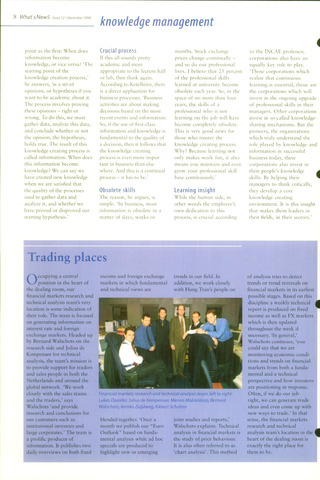knowledge management
Trading places
Crucial process
Obsolete skills
Learning insight
8 What sNewS Issue 12-December 1998
point as the first: When does
information become
knowledge, or vice versa? 'The
starting point of the
knowledge creation process,'
he answers, 'is a set of
opinions, or hypotheses if you
want to be academie about it.
The process involves proving
these opinions - right or
wrong. To do this, we must
gather data, analyze this data,
and conclude whether or not
the opinion, the hypothesis,
holds true. The result of this
knowledge creating process is
called information. When does
this information become
knowledge? We can say we
have created new knowledge
when we are satisfied that
the quality of the processes
used to gather data and
analyze it, and whether we
have proved or disproved our
starting hypothesis.'
If this all sounds pretty
academie and more
appropriate to the lecture hall
or lab, then think again.
According to Ketelhörn, there
is a direct application for
business processes. 'Business
activities are about making
decisions based on the most
recent events and information.
So, if the use of first-class
information and knowledge is
fundamental to the quality of
a decision, then it follows that
the knowledge creating
process is even more impor
tant in business than else-
where. And this is a continual
process - it has to be.'
The reason, he argues, is
simple. 'In business, most
information is obsolete in a
matter of days, weeks or
months. Stock exchange
prices change continually -
and so do our professional
lives. 1 believe that 25 percent
of the professional skills
learned at university become
obsolete each year. So, in the
space of no more than four
years, the skills of a
professional who is not
learning on the job will have
become completely obsolete.
This is very good news for
those who master the
knowledge creating process.
Why? Because learning not
only makes work fun, it also
means you maintain and even
grow your professional skill
base continuously.'
While the human side, in
other words the employee's
own dedication to this
process, is crucial according
to the INCAE professor,
corporations also have an
equally key role to play.
'Those corporations which
realize that continuous
learning is essential, those are
the corporations which will
invest in the ongoing upgrade
of professional skills in their
managers. Other corporations
invest in so-called knowledge-
sharing mechanisms. But the
pioneers, the organizations
which truly understand the
role played by knowledge and
information in successful
business today, these
corporations also invest in
their people's knowledge M
skills. By helping their
managers to think critically,
they develop a core
knowledge creating
environment. It is this insight
that makes them leaders in
their fields, in their sectors.'
Occupying a central
position in the heart of
the dealing room, our
financial markets research and
technical analysis team's very
location is some indication of
their role. The team is focused
on generating information on
interest rate and foreign
exchange markets. Headed up
by Bernard Walschots on the
research side and Julius de
Kempenaer for technical
analysis, the team's mission is
to provide support for traders
and sales people in both the
Netherlands and around the
global network. 'We work
closely with the sales teams
and the traders,' says
Walschots 'and provide
research and conclusions for
our customers such as
institutional investors and
large corporates.' The team is
a prolific producer of
information. It publishes two
daily overviews on both fixed
of analysis tries to detect
trends or trend reversals on
financial markets in its earliest
possible stages. Based on this
discipline a weekly technical
report is produced on fixed
inconie as well as FX markets
which is then updated
throughout the week if
necessary. 'In general,'
Walschots continues, 'you
could say that we are
monitoring economie condi-
tions and trends on financial
markets from both a funda
mental and a technical
perspective and how investors
are positioning in response.
Often, if we do our job
right, we can generate trade
ideas and even come up with
new ways to trade.' In that
sense, the financial markets
research and technical
analysis team's location in the
heart of the dealing room is
exactly the right place for
them to be.
income and foreign exchange
markets in which fundamental
and technical views are
trends in our field. In
addition, we work closely
with Hung Tran's people on
Financial markets research and technical analysis team, left to right:
Lukas Daalder, Julius de Kempenaer, Menno Middeldorp, Bernard
Walschots, Remko Zuijdweg, Rikkert Scholten
blended together. 'Once a
month we publish our "Euro
Outlook" based on funda
mental analysis while ad hoe
specials are produced to
highlight new or emerging
joint studies and reports,'
Walschots explains. Technical
analysis in financial markets is
the study of price behaviour.
It is also often referred to as
'chart analysis'. This method

